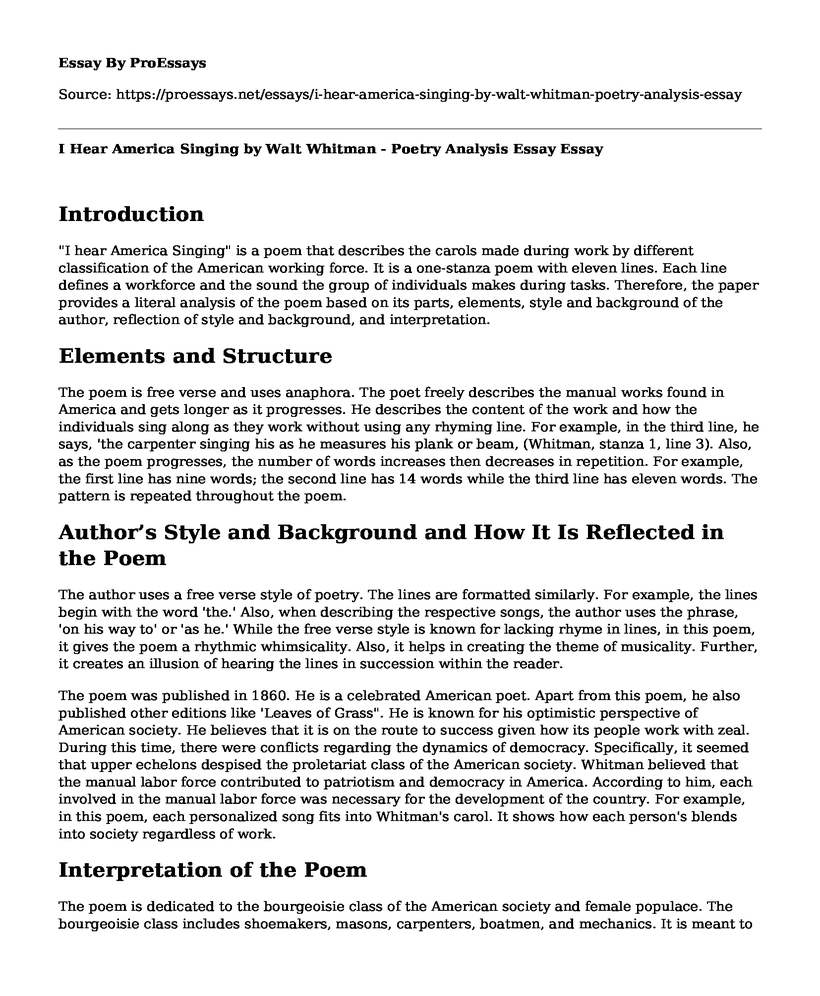Introduction
"I hear America Singing" is a poem that describes the carols made during work by different classification of the American working force. It is a one-stanza poem with eleven lines. Each line defines a workforce and the sound the group of individuals makes during tasks. Therefore, the paper provides a literal analysis of the poem based on its parts, elements, style and background of the author, reflection of style and background, and interpretation.
Elements and Structure
The poem is free verse and uses anaphora. The poet freely describes the manual works found in America and gets longer as it progresses. He describes the content of the work and how the individuals sing along as they work without using any rhyming line. For example, in the third line, he says, 'the carpenter singing his as he measures his plank or beam, (Whitman, stanza 1, line 3). Also, as the poem progresses, the number of words increases then decreases in repetition. For example, the first line has nine words; the second line has 14 words while the third line has eleven words. The pattern is repeated throughout the poem.
Author’s Style and Background and How It Is Reflected in the Poem
The author uses a free verse style of poetry. The lines are formatted similarly. For example, the lines begin with the word 'the.' Also, when describing the respective songs, the author uses the phrase, 'on his way to' or 'as he.' While the free verse style is known for lacking rhyme in lines, in this poem, it gives the poem a rhythmic whimsicality. Also, it helps in creating the theme of musicality. Further, it creates an illusion of hearing the lines in succession within the reader.
The poem was published in 1860. He is a celebrated American poet. Apart from this poem, he also published other editions like 'Leaves of Grass". He is known for his optimistic perspective of American society. He believes that it is on the route to success given how its people work with zeal. During this time, there were conflicts regarding the dynamics of democracy. Specifically, it seemed that upper echelons despised the proletariat class of the American society. Whitman believed that the manual labor force contributed to patriotism and democracy in America. According to him, each involved in the manual labor force was necessary for the development of the country. For example, in this poem, each personalized song fits into Whitman's carol. It shows how each person's blends into society regardless of work.
Interpretation of the Poem
The poem is dedicated to the bourgeoisie class of the American society and female populace. The bourgeoisie class includes shoemakers, masons, carpenters, boatmen, and mechanics. It is meant to appreciate them for their role in the general development of America. It encourages them to continue with their work while knowing that they control the country's future. Also, the poem acknowledges the efforts made by working women. For example, in the eighth line he says, 'the delicious singing of the mother, or the young wife at work, or of the girl sewing or washing,' (Whitman, stanza 1, line 8). The line shows that apart from the general manual labor force, the poet is encouraging women for their contributions in the development of the American society.
Works Cited
Whitman, Walt. I hear America singing. Philomel Books, 1991.
Cite this page
I Hear America Singing by Walt Whitman - Poetry Analysis Essay. (2022, Nov 19). Retrieved from https://proessays.net/essays/i-hear-america-singing-by-walt-whitman-poetry-analysis-essay
If you are the original author of this essay and no longer wish to have it published on the ProEssays website, please click below to request its removal:
- Evaluation of Mary Shelley's Frankenstein Essay
- King Lear Essay Example
- Looking Backwards and Practical Utopia Analysis Essay Example
- Mary Shelley's Frankenstein: Man-Made Monster and Its Creator - Essay Sample
- Literary Analysis Essay on the Veldt by Ray Bradbury
- Essay Example on August Wilson: American Playwright and Chronicler of African American Struggles
- Essay Sample on Education System: Outdated and Unjustified?







